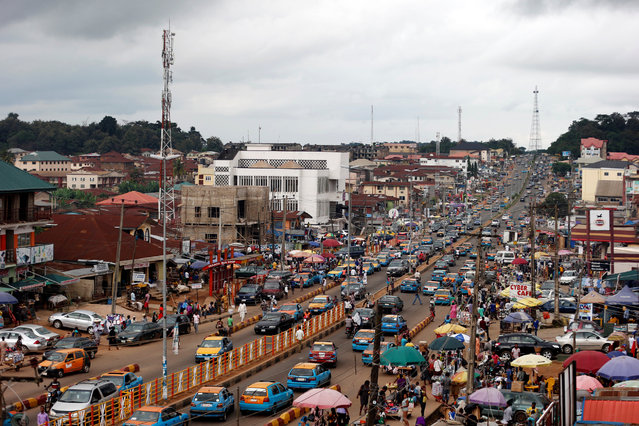Akure: Home Of the Oloyemekun
The city of Akure : The Home of The Oloyemekun
However, the beauty of Akure is not only in its aesthetics and location, its rich culture and tradition also made it a pride of the indigenes. It has been the administrative headquarters of Ondo State for close to 40 years.
The city is equally home to religious bodies. It houses the headquarters of religious organisations including the World Soul Winning Evangelical Mission (WOSEM), founded by the late Apostle Timothy Obadare and the Agape Ministries founded by Bishop Felix Adejumo.
For a long period, the headquarters of the League of Imams and Alfas in South West was in Akure, when an indigene, Late Sheik Yayi Akorede, was its president-general of the league. Other Islamic bodies such as the Nasirul Lai Fathi Society (NASFAT) and Quareeb also have their presence in the city.
Mr. Seun Babalola, an historian and indigene claimed that the rocks are dated back to the Mesolithic period. He said various kinds of animals live on the rocks. They also served as means of protection during wars.
He explained that Akure was founded by Omoremi Omoluabi, a grandson of Ododowa who was the progenitor of the Yoruba race: “Omoluabi who was an Ile-Ife Prince but left Ile-Ife, his grandfather’s principal kingdom, in search of a place to settle after passing a strict test administered by Oduduwa himself, and eventually founded the city of Akure.
“The Palace of the Deji of Akure located at the centre of the town, was built in 1150 AD. It has over 15 courtyards, with each with its unique purpose. For example, in the Ubura courtyard, oaths are taken, and the Ikomo yard is used for naming ceremonies. At present, a bigger and more modern palace is being built to the south of the old palace’s grounds.
“The present palace located close to Oja Oba is where the first Deji lived. The Deji is supported by six high chiefs known as Iwarefa in his or her domain. The totem of Akure is the Leopard and the father of Omoremi, Omoluabi was himself called Ekun.
“It is for this reason that every descendants of the Akure clan are addressed by outsiders as Omo Ekun during the recitation of his or her praise poetry alternatively, as ‘Omo Akure Oloyemekun’, since Omoremi was said to have stayed for a while at Igbo Ooye before coming to the Akure region.
“The most influential Deji in recent history was Oba Adesida I known as Afunbiowo. Many Dejis after him were his direct descendants. He fought for the people of Akure and he ensured that the grew in size and population during his lifetime. He was a quintessential traditional ruler of his time.
“Akure had regained independence by the early 19th century. But around 1818 it was recaptured by Benin forces and the Deji was executed. After 1854, Akure and Ekiti towns came under the rule of Ibadan. This lasted until a rebellion in 1876, followed by a prolonged war in the Yoruba states.
“Within the modern Akure Kingdom are two other constituent communities with their separate chiefs and traditions. The most prominent of the pair is Isikan the other is Isolo. The traditional ruler of Isikan is known as the Iralepo while that of Isolo is known as the Osolo. In the olden days, these were separate towns, but they were brought together under the nominal control of Akure as a result of a number of wars.” It is to the credit of the city, that none of the wars overcame.
One of the Iwarefas, the Elemo of Akure, Chief Sola Adedipe, said the rocks are used for various spiritual and traditional purposes up till date.
He noted that some traditionalists who believe in the metaphysical powers of the rocks worship some of them:
“Some spiritual organisations use the rocks as prayer centres. The Deji who is the custodian of tradition and culture, visits the rocks, especially during traditional festivals
“Some spiritual organisations use the rocks as prayer centres. The Deji who is the custodian of tradition and culture, visits the rocks, especially during traditional festivals


Comments
Post a Comment